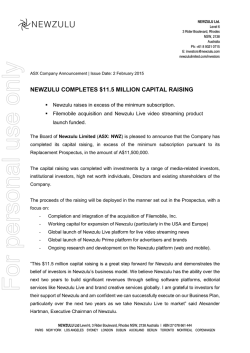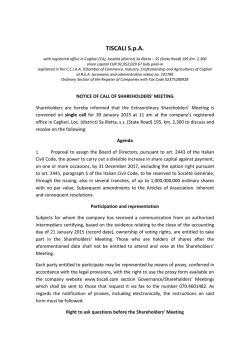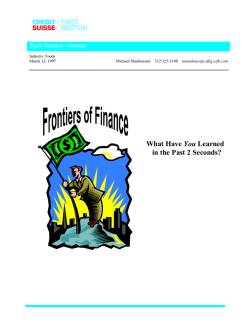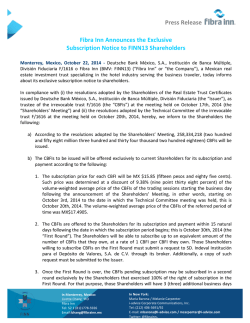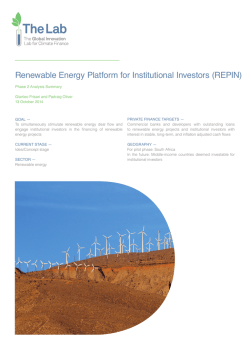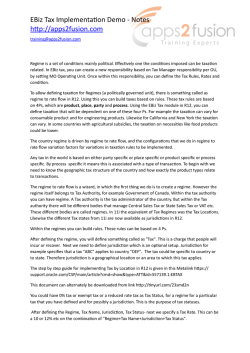
Draft Foreign Investment Law: Fundamental
Legal Update Corporate & Securities Mainland China 28 January 2015 Draft Foreign Investment Law: Fundamental Changes to Foreign Investment Regime in China On 19 January 2015, the Ministry of Commerce of China (“MOFCOM”) released a draft version of the Foreign Investment Law (中华人民共和国外国投资法 (草案征求意见稿)) (“Draft Foreign Investment Law”) for public comments. The deadline to submit comments is 17 February 2015. The Draft Foreign Investment Law will replace the three existing foreign investment laws – Sino-Foreign Equity Joint Venture Law (“EJV Law”), SinoForeign Cooperative Joint Venture Law (“CJV Law”) and Wholly Foreign-Owned Enterprises Law (“WFOE Law”). It will significantly change the existing regime of foreign investment and become the basic law regulating all foreign investment activities in China. Highlights of Changes SCOPE OF “FOREIGN INVESTORS” AND “FOREIGN INVESTMENT” Foreign Investors One major reform introduced by the Draft Foreign Investment Law is that foreign investment will no longer be differentiated and regulated by the form of organisation such as Sino-foreign equity joint venture (“EJV”), Sino-foreign cooperative joint venture (“CJV”) and wholly foreign-owned enterprises (“WFOE”), which will cease to exist as a specific form of business vehicle. Instead, the concept of “actual control” has been introduced. Under the Draft Foreign Investment Law, foreign investors (“Foreign Investors”) not only include non-Chinese individuals, enterprises incorporated under foreign laws, foreign government bodies and international organisations, but also any entity which is under the actual control by these foreign investors. In other words, a Chinese subsidiary controlled by a Foreign Investor (such as what is currently known as a WFOE) will itself be treated as a foreign investor. Given this approach of “actual control”, investments by Chinese companies in industries restricted to foreign investment by using an offshore structure (for instance, internet companies listed in the US) will potentially become legitimate. Equally, going forward, foreign investment using a Variable Interest Entity (“VIE”) structure attempting to circumvent any restriction on foreign shareholding will be expressly prohibited. Please see further below the section on “Impact on VIE Structure”. Foreign Investment A broad scope of foreign investment activities are now subject to the regulation of the Draft Foreign Investment Law (“Foreign Investment”). These do not only include (i) green-field investment and (ii) merger and acquisition, but also (iii) provision of long-term financing (with a term of more than one year) by a Foreign Investor to its subsidiaries in China, (iv) obtaining licence to explore natural resources or operate/construct infrastructure project; (v) acquisition of real property; (vi) controlling, or holding interest of, a domestic entity, by way of contractual or trust arrangements (such as VIE); and (vii) offshore transaction which results in actual control of a domestic company being transferred to a Foreign Investor. NEGATIVE LIST APPROACH Another major change introduced by the Draft Foreign Investment Law is the adoption of a “negative list” approach in respect of foreign investment approval, similar to the model adopted by the China (Shanghai) Pilot Free Trade Zone. Existing regulations require all foreign investors who intend to set up or acquire a company in China to first obtain approval from MOFCOM or its local branch before business registration can be made with the relevant Administration of Industry and Commerce (“AIC”). The Draft Foreign Investment Law fundamentally changes this requirement by limiting foreign investment approval to only those investments listed on a negative list (“Negative List”) to be released by the State Council. The Negative List will set out industry sectors in which Foreign Investment is restricted as well as investment thresholds for Foreign Investment. Foreign Investment outside the Negative List will be offered national treatment and may register with AIC directly. An information reporting procedure is required for all Foreign Investment (please refer to the “Information Reporting System” section below) but this may be completed after the AIC registration. Furthermore, any enterprise with foreign investment must file an annual report to MOFCOM disclosing various operation information. For an enterprise with large business scale (total assets, sales income or revenues exceeding RMB 10 billion per annum in China, or having more than 10 subsidiaries in China) which is controlled by foreign shareholders, an additional obligation to report information on a quarterly basis is also in place. However, it is not entirely clear whether the above threshold for quarterly reporting obligation is calculated on a group basis. While the Negative List is yet to be published, it is generally expected that most foreign investment projects will no longer require pre-approval by MOFCOM when the Draft Foreign Investment Law comes into place. This will reduce the time line required for foreign investment projects and offer parties greater flexibility in structuring their investment as relevant contracts (such as joint venture contracts and equity transfer agreements) will no longer require MOFCOM approval. Compared with the existing regulations, the Draft Foreign Investment Law expands the scope of matters that are subject to national security review. Any Foreign Investment that damages or may potentially damage national security is subject to a unified national security review regime, regardless of industry sector or whether it is controlled by a Foreign Investor. This is a very broad coverage, and even though the Draft Foreign Investment Law highlights a number of areas that are subject to particular review attention (such as national defence, key infrastructure and key natural resources), this expanded regime still raise much uncertainty to foreign investors. Guidelines on national security review will be promulgated separately, which hopefully may provide more detailed clarifications. INFORMATION REPORTING SYSTEM Under the Draft Foreign Investment Law, Foreign Investors and their subsidiaries in China are required to fulfil a number of reporting obligations via an online reporting system to be set up by MOFCOM. An initial information report is required for any Foreign Investment, which should be completed either before the implementation of or within 30 days after the implementation of the transaction (which is the business registration date if the transaction requires registration, or the closing date if the transaction does not require registration). Information to be disclosed in the report includes, among others, basic information of the Foreign Investor (including its actual controlling shareholder) and its subsidiary, and information on the investment (including sources of investment). Joint venture contracts and articles of association are not required to be submitted for this purpose. An updated information report must be submitted within 30 days after any change to the matters stated in the initial investment report occurs. NATIONAL SECURITY REVIEW It is also worth noting that Foreign Investors may not withdraw their applications of national security review without MOFCOM’s prior consent, and administrative reconsideration and administrative litigation are not available for any decision of national security review. IMPACT ON EXISTING FIEs The Draft Foreign Investment Law will no longer regulate corporate governance issues for enterprises with foreign investment; instead, they should follow the same requirements as domestic enterprises under the Company Law, the Partnership Law and the Law on Individual Proprietorship Enterprises etc. The Draft Foreign Investment Law gives existing EJVs, CJVs and WFOEs (“FIEs”) a three-year transitional period to conform with these laws. The following are some of the potential changes to existing joint venture contracts and articles of association: 2 Mayer Brown JSM | Draft Foreign Investment Law: Fundamental Changes to Foreign Investment Regime in China • changing the highest authority of an EJV from the board of directors to the shareholders’ meeting according to the Company Law; • changing the legal status of an unincorporated CJV to either a limited liability company or a foreign-invested partnership; the highest authority of a CJV should no longer be the board of directors or the joint management committee, it should either be changed to the shareholders’ meeting according to the Company Law or follow the provisions in the Partnership Law; • changing the profit distribution ratio of an EJV since profit sharing among shareholders is not required to be proportionate to equity ratio under the Company Law; and • amending the pre-emptive right requirement so that selling shareholders of an EJV or a CJV will only need to obtain consents from more than half of the non-selling shareholders (rather than all the non-selling shareholders according to the EJV Law or CJV Law). This is particularly favourable to the selling shareholders of an EJV or a CJV which has multiple partners. IMPACT ON VIE STRUCTURE The Draft Foreign Investment Law expressly makes VIE structure subject to the same regulatory regime of Foreign Investment. At present, VIE structure falls within a “grey” area and is often used by foreign investors to invest in Chinese entities that are restricted to foreign investment. It is a critical question on how to deal with these existing VIEs. The explanatory note that accompanies the Draft Foreign Investment Law (“Explanatory Note”) introduces three options for public comments: • Option 1: to grandfather any existing VIE that files a record with MOFCOM to confirm that its actual controlling shareholders are Chinese investors; • Option 2: to grandfather any existing VIE that applies to and obtains approval from MOFCOM confirming that its actual controlling shareholders are Chinese investors; or • Option 3: MOFCOM to decide and approve on a case-by-case basis whether to grandfather any existing VIE upon its application. Among these three options, Option 1 should have the least effect on existing VIE structures since it only requires a filing with MOFCOM, while Option 3 gives MOFCOM a huge discretion on whether an existing VIE structure shall be continued. However, these options are intended to legitimise VIE structures with Chinese controlling interest and do not assist “actual” foreign investors who have adopted the VIE structures to avoid restrictions on foreign shareholding in Chinese companies. Questions to be Answered There is no doubt that the Draft Foreign Investment Law will, when promulgated, bring fundamental changes to the foreign investment regulatory regime in China. While the Draft Foreign Investment Law is seen as a very positive sign of Chinese government’s determination to relax restrictions on foreign investment, some questions remain unanswered and need to be clarified. RELATIONSHIP WITH EXISTING INVESTMENT CATALOGUES Currently, the Catalogue of Industries for Guiding Foreign Investment (“Foreign Investment Catalogue”), jointly published by MOFCOM and NDRC is the key legal investment guide on industry sectors to foreign investors. With the adoption of the Negative List approach by the Draft Foreign Investment Law, whether foreign investment is subject to MOFCOM’s approval and at which level will depend on the industry sectors and thresholds set out in the Negative List. Logically, the Negative List should replace the Foreign Investment Catalogue. The NDRC (and MOFCOM) published a revised draft of the Foreign Investment Catalogue for comments in November 2014. It remains to be seen whether the Negative List will be a mere copy of the restricted and prohibited sectors in the Foreign Investment Catalogue or whether it will further relax the current restrictions. The status of the State Council’s Catalogue of Investment Projects subject to Government’s Verification, which also applies to foreign investment, also needs to be clarified. TOTAL INVESTMENT AND REGISTERED CAPITAL The long-existing concepts of total investment and registered capital are unique mechanism of FIEs. As the difference between the total investment and registered capital represents the foreign loan quota of FIEs, the mandatory ratio between the two restricts the FIE’s ability to get foreign financing. Whether such financing quota still applies to enterprises with 3 Mayer Brown JSM | Draft Foreign Investment Law: Fundamental Changes to Foreign Investment Regime in China foreign investment after the Draft Foreign Investment Law enters into effect remains unanswered in the draft law. If it applies, whether short-term foreign shareholders’ loans (with a term of one year or less) will be subject to such quota is also unclear. quarterly reporting is in place. The burden incurred by these multiple layers of disclosure obligations is considerable. Further, the information to be disclosed to MOFCOM overlaps to a great extent with what is required by AIC under its annual reporting system. If the two systems are not on an integrated platform, it will create extra administrative burden for investors. INTERACTION WITH OTHER FOREIGN INVESTMENT REGULATIONS While the Explanatory Note made it clear that the Draft Foreign Investment Law will repeal the EJV Law, CJV Law and WFOE Law, it did not clarify how the Draft Foreign Investment Law may interact with other foreign investment regulations, in particular the Provisions on the Merger and Acquisition of Domestic Enterprises by Foreign Investors (“M&A Regulations”) and various regulations by the State Administration for Foreign Exchange. For foreign acquisition currently subject to the M&A Regulations, although the relevant approval regime will be overhauled by the Draft Foreign Investment Law, whether other regulatory restrictions in the M&A Regulations, such as the three-month payment deadline and MOFCOM’s approval on round-trip investment, will be retained is a question for the legislators to clarify. REPORTING OBLIGATIONS Contact Us For inquiries related to this Legal Update, please contact the following persons or your usual contacts at our firm. Betty Tam Partner T: +86 21 6032 0277 E: [email protected] Xiangyang Ge Partner T: +86 10 6599 9327 E: [email protected] Ping Liu Counsel T: +86 10 6599 9333 E: [email protected] The Draft Foreign Investment Law establishes a comprehensive information disclosure mechanism for Foreign Investors and their subsidiaries in China, ranging from the initial report, the updated report to the annual report, and for large enterprises controlled by Foreign Investors, an additional Mayer Brown JSM is part of Mayer Brown, a global legal services organisation, advising many of the world’s largest companies, including a significant portion of the Fortune 100, FTSE 100, DAX and Hang Seng Index companies and more than half of the world’s largest banks. Our legal services include banking and finance; corporate and securities; litigation and dispute resolution; antitrust and competition; employment and benefits; environmental; financial services regulatory and enforcement; government and global trade; intellectual property; real estate; tax; restructuring, bankruptcy and insolvency; and wealth management. OFFICE LOCATIONS AMERICAS: Charlotte, Chicago, Houston, Los Angeles, New York, Palo Alto, Washington DC ASIA: Bangkok, Beijing, Hanoi, Ho Chi Minh City, Hong Kong, Shanghai, Singapore EUROPE: Brussels, Düsseldorf, Frankfurt, London, Paris TAUIL& CHEQUER ADVOGADOS in association with Mayer Brown LLP: São Paulo, Rio de Janeiro Please visit www.mayerbrownjsm.com for comprehensive contact information for all our offices. This publication provides information and comments on legal issues and developments of interest to our clients and friends. The foregoing is intended to provide a general guide to the subject matter and is not intended to provide legal advice or be a substitute for specific advice concerning individual situations. Readers should seek legal advice before taking any action with respect to the matters discussed herein. Please also read the Mayer Brown JSM legal publications Disclaimer. A list of the partners of Mayer Brown JSM may be inspected on our website www.mayerbrownjsm.com or provided to you on request. Mayer Brown is a global legal services provider comprising legal practices that are separate entities (the “Mayer Brown Practices”). The Mayer Brown Practices are: Mayer Brown LLP and Mayer Brown EuropeBrussels LLP, both limited liability partnerships established in Illinois USA; Mayer Brown International LLP, a limited liability partnership incorporated in England and Wales (authorized and regulated by the Solicitors Regulation Authority and registered in England and Wales number OC 303359); Mayer Brown, a SELAS established in France; Mayer Brown JSM, a Hong Kong partnership and its associated legal practices in Asia; and Tauil & Chequer Advogados, a Brazilian law partnership with which Mayer Brown is associated. Mayer Brown Consulting (Singapore) Pte. Ltd and its subsidiary, which are affiliated with Mayer Brown, provide customs and trade advisory and consultancy services, not legal services. “Mayer Brown” and the Mayer Brown logo are the trademarks of the Mayer Brown Practices in their respective jurisdictions. © 2015 The Mayer Brown Practices. All rights reserved. 0115
© Copyright 2026
